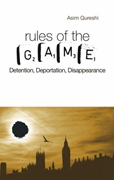Author: Asim Qureshi
Published by Hurst & Company, London
www.hurstpub.co.uk
Price: £12.99/-
Who is terrorising whom?
In the aftermath of the suicide bombings on London’s transport infrastructure in July 2005, the then-prime minister Tony Blair said that ‘the rules of the game have changed’. He referred to how his government planned to respond to the attacks, but few people at the time anticipated that counter-terrorism would become synonymous with circumventing time-honoured concepts such as the rule of law. It is associated now with words such as profiling, incommunicado detention, rendition and torture.
The aim of this brave book is to present the stories of those personally affected by the ill-conceived reaction to the terrorist threat of the United States and her allies. It is about the policies that have been implemented worldwide in order to justify abuses of human rights and the degradation of the rules of common acceptance, embodied in the Universal Declaration of Human Rights.
Rules of the Game investigates global counter terrorism, stark events and degrading abuses through the perspective of those affected and suffered by such measures. It traces true incidents and stories of those who are detained as a result of these policies. “The US has led the way in the War on Terror, but in doing so, it has lowered the threshold of acceptable human behaviour to such an extent that even countries such as China find the moral authority to point the finger back.”
Qureshi lays bare the narratives of those detained and the thousands imprisoned due to suspected links with international terrorism. This ‘war’ has touched the Muslim World in ways that were never expected, making the two billion Muslims of today the largest suspect community ever to have existed. What is at the core of the matter is the value of fundamental norms which have been laid by the wayside through the inhuman treatment of the detainees.
The author recounts how the 9/11 attack on the US resulted in a form of legal blindness that struck the international community, including legal scholars around the world. “The unequivocal statements made by the Bush administration made it very clear that there was no option other than to agree with a US-centric counter terrorism response: ‘In this conflict, there is no neutral ground.’” From such statements began Operation Enduring Freedom, opening a Pandora’s box of legal manipulations.
Asim Qureshi’s indefatigable research took him to East Africa, Pakistan, Sudan, USA, Bosnia and Canada to record the testimonies of the victims of these detention policies. He analyses the effects of global counter-terrorism not as individual policies or pieces of legislation, but rather as parts of a larger phenomenon that has uniformly changed the way governments view justice and eroded fundamental norms in pursuit of often-phantom terrorists. Among the issues he discusses are profiling of Muslims by security services and concurrent mass arrests; the use of detention without charge, control orders and incommunicado detention; rendition; domestic detention policies in North America; and how the establishment of Guantanamo Bay has affected global perceptions of justice and imprisonment.
In his concluding chapter, Qureshi notes: “Governments around the world must pay attention to the history of political violence and learn from the positive result that dialogue has achieved. Any claim that the threat of Al Qaeda and the extent of violence are unprecedented and false. The need for dialogue is not limited to government levels. There currently exists a climate of terror amongst the Muslim communities in Britain and US, making them think that they cannot speak about certain issues. Jihad has become a taboo word in the mosques as elders are concerned such talk could lead to criminalisation. The lack of opportunity to discuss these and other issues in Islamic centres forces those still interested in peace to attempt their own research without guidance.”
He adds, “To genuinely counter terrorism, the mosques must be able to hold seminars and conferences on the subject of Jihad without concern that by doing so they will automatically be criminalised. And these debates must be free from government interference. By trying to first understand the perspective of both sides there is the hope that there can be dialogue and with that hope comes the hope for change.”
About the author:
Asim Qureshi was trained in law and is currently the Senior Researcher for Cageprisoners. With his team of researchers, he has written and published many reports exposing the use of unlawful detention, rendition, and torture in the ‘war on terror’.





